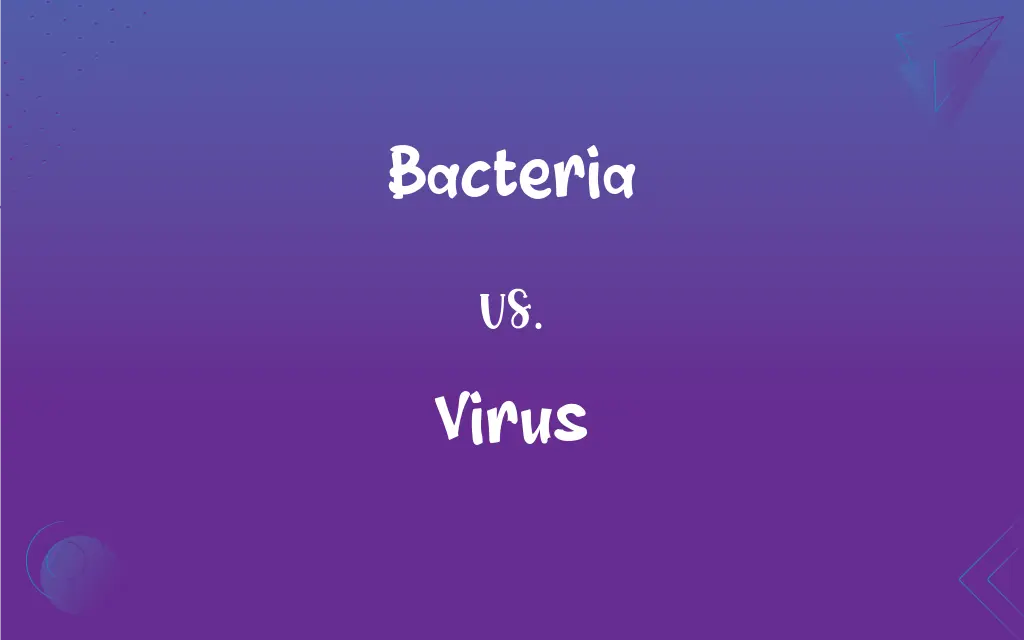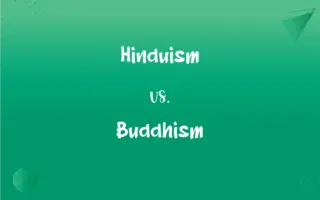Bacteria vs. Virus: What's the Difference?
Edited by Janet White || By Harlon Moss || Updated on July 11, 2024
Bacteria are single-celled microorganisms, while viruses are smaller infectious agents that need host cells to replicate.

Key Differences
Bacteria are single-celled organisms with simple structures, typically having cell walls and membranes. In contrast, viruses are much smaller, lacking the cellular machinery to reproduce on their own, relying instead on host cells.
While bacteria can be found thriving in various environments, from soil to human intestines, viruses are only active inside host organisms, where they hijack cellular processes to replicate.
Most bacteria reproduce through binary fission, a process where a single bacterial cell divides into two. Viruses, however, reproduce by infecting host cells and commandeering the cell's machinery to produce more virus particles.
Some bacteria are beneficial and play vital roles in processes like fermentation and digestion. Viruses, being parasitic, generally have detrimental effects on their host, leading to various diseases.
Antibiotics can target and kill or inhibit bacteria but are ineffective against viruses, which require antiviral drugs or vaccines for control and prevention.
ADVERTISEMENT
Comparison Chart
Basic Definition
Single-celled microorganisms
Infectious agents requiring hosts to replicate
Size
Larger, typically a few micrometers
Much smaller, often nanometers in size
Reproduction
Binary fission
Requires host cell machinery
Treatment
Antibiotics
Antivirals or vaccines
Beneficial/Detrimental
Can be both (e.g., gut flora)
Typically detrimental (cause diseases)
ADVERTISEMENT
Bacteria and Virus Definitions
Bacteria
Microscopic living organisms that can thrive in diverse environments.
Some bacteria are essential for making yogurt.
Virus
A pathogen that can cause diseases in animals, plants, and bacteria.
The HIV virus affects the immune system.
Bacteria
Single-celled organisms without a true nucleus.
Probiotics contain beneficial bacteria that aid digestion.
Virus
A microscopic infectious agent that needs a living cell to multiply.
The flu is caused by the influenza virus.
Bacteria
Tiny organisms responsible for decay, fermentation, and disease.
Spoiled food contains harmful bacteria that can cause illness.
Virus
Tiny entities that can only replicate inside the cells of living organisms.
The cold sore was triggered by a virus.
Bacteria
Ubiquitous organisms that play roles in the ecosystem, health, and industry.
The human gut is home to trillions of bacteria.
Virus
Agents considered as being on the boundary of living and non-living.
The virus is studied under virology, a branch of microbiology.
Bacteria
Prokaryotic microorganisms that have cell walls but lack organelles and an organized nucleus.
The study of bacteria is known as bacteriology.
Virus
Non-living particles with genetic material enclosed in a protein coat.
The virus injected its DNA into the host cell.
Bacteria
Plural of bacterium.
Virus
Any of various submicroscopic agents that infect living organisms, often causing disease, and that consist of a single or double strand of RNA or DNA surrounded by a protein coat. Unable to replicate without a host cell, viruses are typically not considered living organisms.
Bacteria
(US) A type, species, or strain of bacterium.
Virus
A disease caused by a virus.
FAQs
How do viruses replicate?
Viruses replicate by infecting host cells and using the cell's machinery.
How do bacteria reproduce?
Bacteria reproduce through a process called binary fission.
Are all bacteria harmful?
No, many bacteria are beneficial and play essential roles in our body and environment.
Why are viruses not considered living?
Viruses lack cellular machinery, cannot carry out metabolic processes, and can't reproduce outside host cells.
What is bacteria?
Bacteria are single-celled microorganisms without a true nucleus.
Do bacteria have DNA?
Yes, bacteria contain DNA within their cell, but it's not enclosed in a true nucleus.
What are the beneficial uses of bacteria?
Bacteria are used in food production (like yogurt), waste decomposition, and even in some medical treatments.
Can antibiotics treat viral infections?
No, antibiotics target bacteria and are ineffective against viruses.
Are there any beneficial viruses?
Some viruses can be beneficial in biotechnology and therapy but are generally considered pathogens.
What size are bacteria typically?
Bacteria are usually a few micrometers in size.
How small are viruses?
Viruses are often nanometers in size, much smaller than most bacteria.
How do bacteria benefit human health?
Beneficial bacteria aid in digestion, produce vitamins, and help protect against harmful bacteria.
Can viruses be seen under a regular microscope?
No, viruses are often too small to be seen clearly under a regular microscope and require electron microscopes.
What is a virus?
A virus is a microscopic infectious agent that requires a living cell to multiply.
How are viruses structured?
Viruses have genetic material (DNA or RNA) enclosed in a protein coat.
How can bacterial infections be treated?
Bacterial infections are typically treated with antibiotics.
Where can bacteria be found?
Bacteria are ubiquitous and can be found in soil, water, air, and inside living organisms.
How can viruses be prevented?
Viral infections can often be prevented through vaccination.
Why are some bacteria resistant to antibiotics?
Overuse or misuse of antibiotics can lead to the evolution of antibiotic-resistant bacteria.
Can viruses infect bacteria?
Yes, viruses that infect bacteria are called bacteriophages.
About Author
Written by
Harlon MossHarlon is a seasoned quality moderator and accomplished content writer for Difference Wiki. An alumnus of the prestigious University of California, he earned his degree in Computer Science. Leveraging his academic background, Harlon brings a meticulous and informed perspective to his work, ensuring content accuracy and excellence.
Edited by
Janet WhiteJanet White has been an esteemed writer and blogger for Difference Wiki. Holding a Master's degree in Science and Medical Journalism from the prestigious Boston University, she has consistently demonstrated her expertise and passion for her field. When she's not immersed in her work, Janet relishes her time exercising, delving into a good book, and cherishing moments with friends and family.
































































